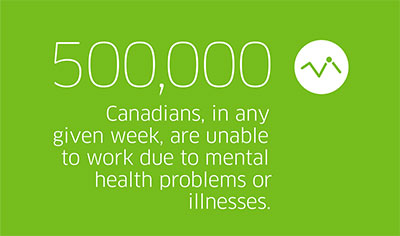Most managers want to create a psychologically healthy environment for their employees. Yet 16 percent of working Canadians say their workplace is a frequent or ongoing source of feelings of depression, anxiety or other mental illness. And 38 percent of employees say they wouldn’t feel comfortable telling their boss if they did have a mental health problem.
 Canada’s National Standard for Psychological Health and Safety in the Workplace was established in 2013 to change all that. A truly groundbreaking, first-in-the-world initiative, the Standard provides a framework to promote mental health and prevent psychological harm to employees in Canadian workplaces and organizations of all sizes and sectors.
Canada’s National Standard for Psychological Health and Safety in the Workplace was established in 2013 to change all that. A truly groundbreaking, first-in-the-world initiative, the Standard provides a framework to promote mental health and prevent psychological harm to employees in Canadian workplaces and organizations of all sizes and sectors.
Tools for Companies Big and Small
You could think of the Standard as a set of voluntary and free guidelines, tools and courses—a complete roadmap for making the work environment a place that fosters mental health.

Wondering how to get started? Learn how to Implement the Standard first. Important resources you’ll find there: Assembling the Pieces: An Implementation Guide to the National Standard for Psychological Health and Safety in the Workplace to help senior leaders, human resource managers, and occupational health and safety professionals navigate through the Standard. The Assembling the Pieces Toolkit provides practical advice for implementing the Standard in a free online course.
You’ll also learn about the 13 Factors that impact mental health and can access a video series to educate your employees.
A Success Story
The Standard is gaining traction among Canadian companies and organizations. To cite one case history, Toronto East General Hospital (TEGH) wanted to improve employee mental health and employee engagement (defined as feeling passionate, committed and willing to put forth extra effort).
Since implementing the Standard, staff engagement scores for TEGH have significantly increased, placing them as the leading community hospital in 9 out of 11 engagement categories.
Better yet, TEGH staff experienced a 7 percent decrease in overall healthcare costs over the last four years and a decrease in average days absent from 10.66 to 6.55. TEGH believes that these improvements in staff mental health and engagement have been a significant factor in improving their patient satisfaction and overall quality ratings.
Check out this video to find out more about the National Standard of Canada for Psychological Health and Safety.